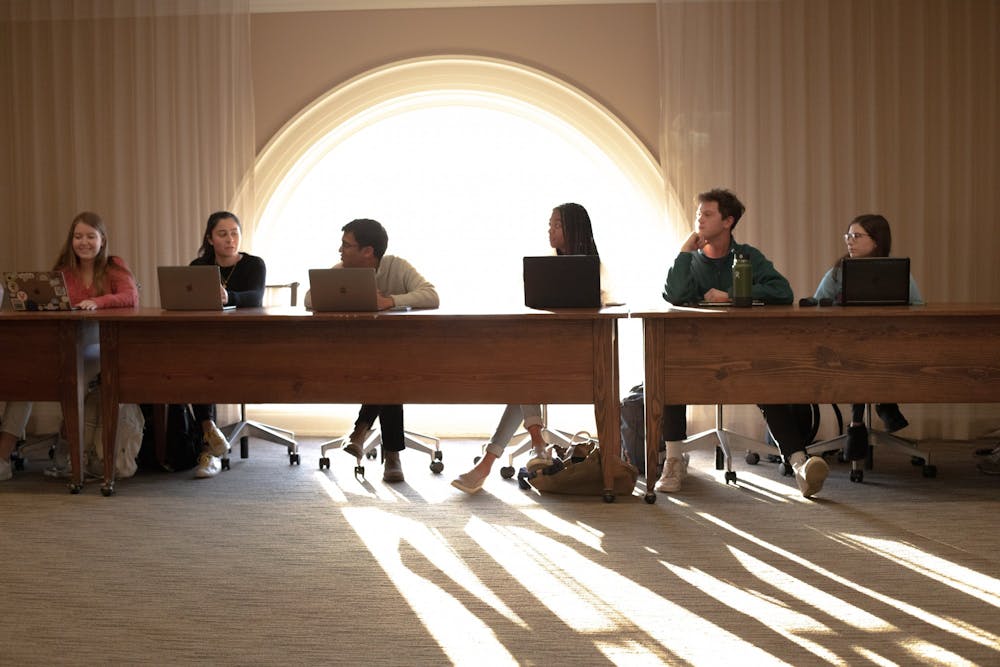In the Honor Committee’s first meeting following the elections of new representatives — including third-year College student Hamza Aziz as chair — members voted to let accused students pause their case until the multi-sanction system is formally ratified.
Following the passage of March’s historic student referendum, the new multi-sanction Honor system will officially go into effect July 1. Previously, the only sanction under the single-sanction system was a two-semester leave of absence — the newly passed system will include, but is not limited to, amends, education, leave of absence or suspension.
Cases that are reported prior to July 1 — when the multi-sanction system takes effect — would have continued to be processed under the single-sanction law, creating a possible discrepancy in outcomes, according to Aziz. Aziz gave the Committee two options — they could decide either to proceed with all cases reported under the single-sanction system, or give accused students the choice to pause their cases until the multi-sanction system formally takes effect in July.
Rachel Liesegang, vice chair for the undergraduate community and third-year College student, supported the option of pausing cases until July 1, citing increased case efficiency.
“Any reports going forward, likely the investigation or the full process, would not finish up before the end of the semester,” Liesegang said. “I think it would be difficult to be dealing simultaneously with cases under the old system as well as cases under the new system.”
Nishita Ghanate, vice chair for investigations and third-year College student, also agreed with giving students reported before July 1 the option to pause their cases. Ghanate said it would be important to communicate the option to advisors and show them how to explain this choice to accused students, and how their choice would affect their case.
“We can certainly talk to the advisors and make sure they know when they're talking to the students about how to frame the question,” Ghanate said.
16 out of 21 members were present, meaning the Committee reached quorum and they were able to vote on constitutional and bylaw matters. All 16 Committee members present then voted unanimously to give students the option to pause their cases.
Besides case processing issues, the Committee also presented the bylaw revision timeline. Following the student vote in March, many bylaws have to be rewritten in order to reflect the changes made by the student referendum.
The Committee currently has a goal to finalize new bylaws by mid-June so that they can begin working on outreach and training support officers — students who help guide the case process for accused students. Officers are separated into three pools — advisor, counsel and educator. Students are recruited for this role through an application process.
Aziz said he wants to change bylaws in a more informal, conversational format, rather than focusing directly on the language of the bylaws. He said he hopes to discuss bylaws at length and debate their proposed changes. The Committee will work together to write the bylaws following the initial debate and discussion.
[The goal is a] discussion format where we kind of raise points, we debate, then everything is recorded, but we're not actually sitting here together and writing sentences of language for bylaws,” Aziz said. “I don't think that would be the most efficient use of our time.”
The Committee also discussed a pending co-sponsorship from the Accomodation Access Fund that was tabled by the Committee in an earlier meeting. Co-sponsorships are a partnership between the Committee and various CIOs on grounds in which the Committee helps fund events and activities that engage the student body. The Accomodation Access Fund assists students who do not have the proper paperwork for Student Disability Access Center accommodations. AAF requested $5,000 for the co-sponsorship.
The Committee is allocated $25,000 each year in co-sponsorship funds from the Committee’s endowment. After collecting unused funds from the previous term, the new Committee now has an extra $10,000 for co-sponsorships until a deadline of July 1. Due to the smaller co-sponsorship budget last term, the co-sponsorship was initially tabled, but will be reconsidered under the increased funding.
AAF will present their co-sponsorship during next Sunday’s meeting to a Committee vote.
Outside of this, the Committee also discussed administrative issues and gave school and executive updates. The Committee formally ratified the election of the Executive Committee unanimously.
There is currently one active Honor investigation and a hearing scheduled for Sunday.
The Committee adjourned the meeting early at 7:33 p.m. The next Honor Committee meeting will be held Sunday at 7 p.m. in the Trial Room of Newcomb Hall.







